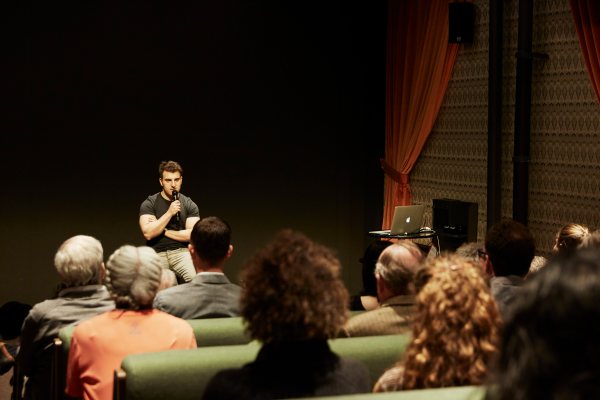Airbnb wants to mold its hosts into a powerful organizing force, akin to a union, to advocate on its behalf with local governments around the world and to serve as an ideological rebuke to the advances of AI at other tech firms.
As part of that effort to increase engagement with hosts, CEO Brian Chesky announced today that he is embarking on a world tour, forming a host advisory board that will provide feedback to the company and sit in on one of its four annual board meetings, and do monthly check-ins with Airbnb users via Facebook Live.
“I want to be held accountable to the community,” Chesky, who is modifying his title to CEO and head of community, told a group of hosts gathered at Airbnb HQ. “It’s incredibly important because when we sit in a room trying to make decisions, we want to make sure we’re doing it for the community, not to the community.”
Chesky will visit London, New York, Cape Town, Delhi, and Beijing to meet with hosts over the next couple of weeks, and hinted that more changes are coming to improve customer service and host experience.
Putting hosts front and center is part of Airbnb’s business strategy — after all, the company relies on people to list their homes for rent — but it also hints at Airbnb’s transition into political advocacy. The company has been criticized by politicians for its impact on housing crises in major cities and by startup advisers for being caught flat-footed by regulators. But over the last two years, Airbnb has tried to shift those perceptions by taking a more active role in politics, most recently with its responses to the Trump administration’s policies on immigration and transgender students.
Although those Trump-inspired efforts grab headlines, the bread and butter of Airbnb’s political campaigning is still its hosts. Chesky linked the Trump effect and Airbnb’s homegrown efforts to rising economic insecurity.
“The president of the United States is an example of economic insecurity,” he said. “I’m concerned about the concept of automation. Many jobs will be automated; a lot will be. This will have benefits for people but it also has a huge cost. I worry that ‘Made in America’ will become ‘Made by robots in America.'”
Chesky’s remarks draw a line between the company he co-founded and other members of the so-called sharing economy like Uber, who see increased automation as the future of their businesses. Whereas Uber plans to replace its human drivers with self-driving vehicles, Chesky stressed that humans will remain central to Airbnb’s business. “Everything at Airbnb will have people at the center of it. It’s an important commitment that everything we do will be powered not just by technology but by people.”
Convincing customers to participate in political advocacy is also part of Uber’s anti-regulation playbook, but Uber is betting longterm on riders, not drivers, as their best advocates. Airbnb thinks it needs both consumers and hosts for a successful advocacy equation.
“Tech will never replace what you do, although it might replace other jobs,” Chesky told the group of hosts. “A robot can open a door and let you into a home, but it’s not going to make you feel welcome.”
Highlighting the importance of hosts in Airbnb’s ecosystem is part of the company’s political strategy — after Chesky and the hosts departed for a reception, head of global policy Chris Lehane briefed reporters on the ways Airbnb has successfully convinced its users to advocate for the company with local politicians. Lehane said that, since 2014, more than 10,000 Airbnb users have contacted an elected official and more than 50,000 have signed petitions to support the company. Drawing on his experience with political campaigns, Lehane noted that a down-ticket 2015 San Francisco ballot initiative to restrict short-term rentals drew more total votes than the mayoral race that year. It’s an example of Airbnb’s success in mobilizing its users as political advocates — and Lehane said he raises the point with lawmakers, stressing Airbnb’s popularity with their growing millennial constituencies.
Airbnb signs up new users through word-of-mouth, and Lehane said a similar approach has worked for political advocacy. “What we know is that the majority of people who travel on Airbnb typically learn about it from friends or family,” Lehane said. “It translates into how our community thinks about people operating Airbnbs. Hosts advocate for us from a consumer perspective, but also advocate for us from a policy perspective.”
To keep users politically engaged, Airbnb is expanding its host clubs from the 114 groups currently active around the world to 1,000 by the end of 2018. Lehane compared the clubs to unions or guilds and said they would serve as central hubs for organizing. “They are more than political advocacy organizations,” he said. “They evolved from a policy tool to a broader movement built around our community.”
